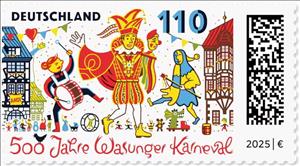Stamp: Wasungen Carnival, 500 Years (Germany, Federal Republic 2025)
Wasungen Carnival, 500 Years (Germany, Federal Republic 2025)
06 February (Germany, Federal Republic ) within release Wasungen Carnival, 500 Years goes into circulation Stamp Wasungen Carnival, 500 Years face value 10*110 Euro cent
| Stamp Wasungen Carnival, 500 Years in catalogues | |
|---|---|
| Michel: | Mi: DE 3888 |
| Colnect codes: | Col: DE 2025.02.06-02 |
Stamp is horizontal format.
Also in the issue Wasungen Carnival, 500 Years:
- Full Pane - Wasungen Carnival, 500 Years face value 10*110;
- Stamp - Wasungen Carnival, 500 Years face value 10*110;
Stamp Wasungen Carnival, 500 Years it reflects the thematic directions:
An anniversary is the date on which an event took place or an institution was founded in a previous year, and may also refer to the commemoration or celebration of that event. For example, the first event is the initial occurrence or, if planned, the inaugural of the event. One year later would be the first anniversary of that event. The word was first used for Catholic feasts to commemorate saints. Most countries celebrate national anniversaries, typically called national days. These could be the date of independence of the nation or the adoption of a new constitution or form of government. The important dates in a sitting monarch's reign may also be commemorated, an event often referred to as a "Jubilee".
Carnival is a festive season that occurs during the Christian liturgical period of Shrovetide, the three days before Lent. consisting of Quinquagesima or Shrove Sunday, Shrove Monday, and Shrove Tuesday or Mardi Gras.
A festival is an event celebrated by a community and centering on some characteristic aspect or aspects of that community and its religion or cultures. It is often marked as a local or national holiday, mela, or eid. A festival constitutes typical cases of glocalization, as well as the high culture-low culture interrelationship. Next to religion and folklore, a significant origin is agricultural. Food is such a vital resource that many festivals are associated with harvest time. Religious commemoration and thanksgiving for good harvests are blended in events that take place in autumn, such as Halloween in the northern hemisphere and Easter in the southern.
A musical instrument is a device created or adapted to make musical sounds. In principle, any object that produces sound can be considered a musical instrument—it is through purpose that the object becomes a musical instrument. A person who plays a musical instrument is known as an instrumentalist. The history of musical instruments dates to the beginnings of human culture. Early musical instruments may have been used for rituals, such as a horn to signal success on the hunt, or a drum in a religious ceremony. Cultures eventually developed composition and performance of melodies for entertainment. Musical instruments evolved in step with changing applications and technologies.



